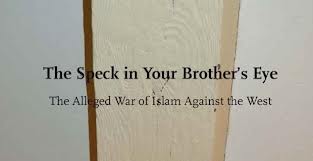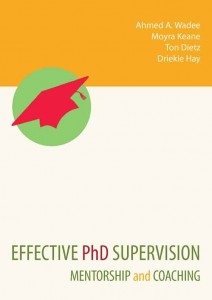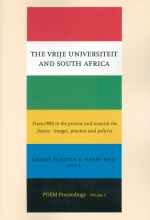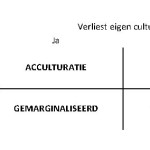The Speck in Your Brother’s Eye – The Alleged War of Islam Against the West – The Speck In Your Brother’s Eye
 The title of this pamphlet contains words spoken by Jesus, admonishing us to take a good look at ourselves before we judge others. I believe that Wilders’ and his party’s discourse and ideology are not innovative or new at all, and that they fit seamlessly in the world’s history of religions and ideologies characterized by a strained relationship with violence, be it psychological or physical. I am not going to get into a discussion about what is a religion and what is an ideology. Both can mean a lot to people and both have a special vision or view of the world, the universe, and the questions of life. Both strive for ideal societies, religions all do so with regard to the afterlife and, if possible, here on earth as well; ideologies are restricted to the latter.
The title of this pamphlet contains words spoken by Jesus, admonishing us to take a good look at ourselves before we judge others. I believe that Wilders’ and his party’s discourse and ideology are not innovative or new at all, and that they fit seamlessly in the world’s history of religions and ideologies characterized by a strained relationship with violence, be it psychological or physical. I am not going to get into a discussion about what is a religion and what is an ideology. Both can mean a lot to people and both have a special vision or view of the world, the universe, and the questions of life. Both strive for ideal societies, religions all do so with regard to the afterlife and, if possible, here on earth as well; ideologies are restricted to the latter.
Wilders is very outspoken on Christianity, Islam and the ideas that fuelled the French Revolution. He praises the first and considers the second and third evil by nature. Still, the three of them have more in common than Wilders wants us to believe. In what follows I would like to draw a concise comparison between the three, formulating their respective goals, and subsequently discussing the ways in which the three aim to realize these goals. The discussion I present is in no way exhaustive.
Christianity is characterized by a strong sense of millenarianism. Christ clearly stated in his teachings that his kingdom is not of this earth. It is in heaven and Christians should live their lives in such a way that they deserve to get to heaven in the afterlife. To attain heaven they will have to adhere to the principles of Christianity, which basically entails no more than behaving in accordance with the commandment to love your neighbor as yourself, and do unto others as you would be done by. Love, one could say is the basic tenet of Christianity. Today there are over 2 billion Christians in the world. Read more
Napoleon, the Simpsons and the Dutch
As time marches on, the Dutch will continue to perplex and astonish people throughout the world, although, paradoxically, they will carry on their cultural ideologies of striving to be just average and acting normal because that’s weird enough. People from all parts of the world will continue to envision Holland as this idyllic place full of fairy-tale images, tulips, windmills, cheese, picturesque landscapes and happy-go- lucky inhabitants. People will continue to envision the capital city, Amsterdam, as this insidious place where everyone is high on drugs, engaging in licentious street prostitution and killing their unborn and elderly.
People will also continue viewing the Netherlands as a bastion of liberalism where traditionalism is rejected and where socialistic policies are undermining capitalism and helping to steer the world towards communism. And people will continue to envision the Dutch as these strange people who still walk around in those infamous wooden shoes. The Dutch have been misunderstood since the beginning of their existence; some things just don’t ever change.
Effective PhD Supervision – Mentorship and Coaching
 The complete book online
The complete book online
Chapter One: Chapter One: Introduction
Chapter Two: Guidelines for Supervisors
Chapter Three: Guidelines for Mentors
Chapter Four: Coaching: Charting your own Path
Chapter Five: The Relationship between PhD Candidate and Supervisor
Chapter Six: A Holistic Approach to PhD Support
Chapter Seven: Bibliography and Recommended Reading
Appendices and Acknowledgments
Effective PhD Supervision – Chapter Five – The Relationship between PhD Candidate and Supervisor
 5.1 Styles of Supervisor-Candidate Relationships: A typology
5.1 Styles of Supervisor-Candidate Relationships: A typology
5.1.1. Introduction
Every PhD supervisor is different and every PhD candidate as well. Hence, relationships between a supervisor and a PhD candidate are full of idiosyncrasies and peculiarities. Many are the stories about strange professors, with odd habits, and full of eccentricity. And among professors, memories of strange misunderstandings with their PhD candidates form part of their discussions over drinks. However, there is order in this chaos. In a number of SANPAD supervisory workshops in South Africa, and in Ceres training courses in the Netherlands, we experimented with an approach in which a typology was designed of possible relationships. Participants in these workshops were then first asked to position their own relationship with their former PhD supervisor in this typology. As a second step they were asked to do the same with each of their prior and current PhD supervision relationships. And, indeed, there appeared to be order in the chaos, but with a lot of comments. Let us first look at the typology as such.
5.1.2 Styles of Supervision
In discussing styles of supervision there are the following important variables:
– Relationship behaviour: businesslike or personal
– Task behaviour: commitment (more/less) and product or process orientation
Businesslike behaviour can be defined as a type of relationship where first and foremost supervisor and PhD candidate focus on their work: the research to be done, the research design, the progress of analysis, writing and publication strategies. Personal elements are less important, and in extreme cases, regarded as completely irrelevant or taboo for discussion.
Personal behaviour is the opposite: the focus is on personal matters, and in extreme cases work is hardly ever mentioned. The supervisor knows, or tries to know everything about the personal circumstances and characteristics of the PhD candidate, and in meetings personal affairs and emotions get a lot of attention. Often there is or develops a relationship of personal or family friendship, sometimes progressing further than that.
POEM: The Vrije Universiteit And South Africa: 125 Years Of Sentiments And Good Faith
 This academic year (2005), the Vrije Universiteit enjoys its 125th anniversary.[1] In 1879, a handful of orthodox reformed Dutch gentlemen founded an Association for the advancement of Christian Higher Education, and on 20 October 1880, Abraham Kuyper inaugurated the Vrije Universiteit, Academia libera reformata, by delivering his famous lecture on Sphere Sovereignty, Soevereiniteit in eigen kring.
This academic year (2005), the Vrije Universiteit enjoys its 125th anniversary.[1] In 1879, a handful of orthodox reformed Dutch gentlemen founded an Association for the advancement of Christian Higher Education, and on 20 October 1880, Abraham Kuyper inaugurated the Vrije Universiteit, Academia libera reformata, by delivering his famous lecture on Sphere Sovereignty, Soevereiniteit in eigen kring.
Kuyper was never a very modest man, and he certainly was not inclined to be modest at that moment. The credits of the university he opened, were three faculties, five professors and five students. As an accomplished rhetorician he described it as onze kleine School, met den Universiteitsnaam zelve tot blozens toe verlegen (our small school, blushing to be called a university). This was not meant as an apology, but rather to make a Hegelian turn: the real credits of the VU were written in the Synod of Dordt, its claim to nobility was the courage and moral dedication of its supporters, and its worldwide value and importance (Kuyper 1880). In the Kuyperian world panorama, his University would become the intellectual centre of the international Calvinist world – the academic power-house for all the reformed churches, nations and societies in Europe, America, and the Dutch colonies in the East. And for South Africa, of course.
October 1880: this is also the month in which Piet Cronjé, on behalf of 127 Transvaler burghers, declared to the Landdrost of Potchefstroom that they would no longer pay any taxes to the British government, as that government had illegally annexed and stolen their country (Van Oordt 1898). His language was quite akin to what Abraham Kuyper had written as a commentary on Shepstone’s annexation of the Transvaal in 1877, when he stated in his daily De Standaard: robbery is a sin to the eyes of the Lord, even by a crowned robber. Read more
POEM: ‘New’ Scientific Practice In South Africa With Special Reference To Land Reform
 ..training new generations of scientists and technologists oriented towards the solving of real problems (White Paper on Science and Technology 1996).
..training new generations of scientists and technologists oriented towards the solving of real problems (White Paper on Science and Technology 1996).
The SandT capacity of the country is running as fast as it can, but is still losing ground (National Research and Development Strategy 2000).
Introduction
(2005) The landscape of scientific practice and higher education in South Africa has changed drastically since 2 February 1990. The changes that occurred in these fields during the last decade of the 20th century were probably the most incisive in the history of science and higher education in South Africa.
When the democratically elected government came into power in 1994, science was confronted with two main challenges, namely to transform the system so that the welfare of all the inhabitants could be promoted and to make South Africa competitive in a globalising world.
The new government inherited a sound science infrastructure. It was a widely dispersed and uncoordinated system in which scientists enjoyed international recognition for transplanting hearts and for enabling the deepest exploitation of mines in the world. However, the system was mainly directed at the promotion of the welfare of the white community and was strongly focussed on military defence; the provision of energy and food; and the combating of diseases.[1]
In this transformation process, South Africa was very receptive to theories, models and schools of thought. Expertise from abroad was not provided in all instances without direct or subtle influence. There are already indications that certain models, that were applied successfully elsewhere, cannot be transferred without adaptations to the South African situation, where complex issues have to be addressed. The question that arises is whether the government implements the policy documents that were designed by intellectuals who are not part of the bureaucracy. Read more



